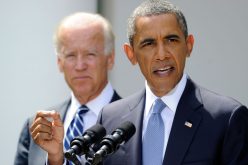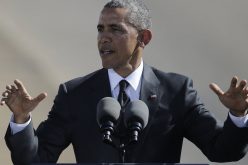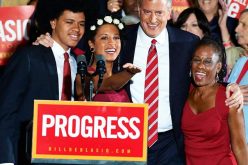 By KATE ZERNIKE and JONATHAN MARTIN, NEW YORK TIMES
By KATE ZERNIKE and JONATHAN MARTIN, NEW YORK TIMES
Gov. Chris Christie of New Jersey won re-election by a crushing margin on Tuesday, a victory that vaulted him to the front ranks of Republican presidential contenders and made him his party’s foremost proponent of pragmatism over ideology.
Mr. Christie declared that his decisive win should be a lesson for the nation’s broken political system and his feuding party: In a state where Democrats outnumber Republicans by over 700,000, Mr. Christie won a majority of the votes of women and Hispanics and made impressive inroads among younger voters and blacks — groups that Republicans nationally have struggled to attract.
The governor prevailed despite holding positions contrary to those of many New Jersey voters on several key issues, including same-sex marriage, abortion rights and the minimum wage, and despite an economic recovery that has trailed the rest of the country.
He attracted a broad coalition by campaigning as a straight-talking, even swaggering, leader who could reach across the aisle to solve problems.
“I know that if we can do this in Trenton, N.J., then maybe the folks in Washington, D.C., should tune in their TVs right now and see how it’s done,” Mr. Christie told a packed crowd at Convention Hall in Asbury Park, where his musical idol, Bruce Springsteen, holds holiday concerts, and where red and blue lighting gave the gathering a presidential campaign-like glow.
The governor all but lectured Republicans about how to appeal to groups beyond their base. “We don’t just show up in the places where we’re comfortable, we show up in the places we’re uncomfortable,” he said, adding, “You don’t just show up 6 months before an election.”
Around the country, Republicans alarmed by the surging grass roots support for the Tea Party wing were cheered by Mr. Christie’s success, saying they hope their party will learn not only from the size of Mr. Christie’s margin over Barbara Buono, a Democratic state senator, but also from the makeup of his support.
“We’ll be led back by our governors, and Chris Christie is now at the forefront of that resurgence,” said Ed Gillespie, a former chairman of the Republican National Committee.
“He’s proved that a conservative Republican can get votes from Hispanics and African-Americans, that a pro-life governor can get votes from women. This means that those voters are available to us, that we’re not shut out demographically or geographically — that it’s worth the effort.”
Mr. Christie’s strategy of bipartisanship and outreach deliberately echoed that of another Republican governor who seized the White House after eight years of Democratic control: George W. Bush.
“We work together and they don’t,” Mr. Christie said in an interview on Tuesday morning, contrasting Trenton and Washington. “It’s not like we like each other any more than they do. I got plenty of Democrats I don’t like here and that don’t like me. But we’ve made the decision that we’re going to work together.”
In the interview, Mr. Christie said intelligent voices were being drowned out in Washington, and described the effort led by Senator Ted Cruz of Texas to cut off funding for President Obama’s health care program as “a monumental failure.”
The swell of national attention around Mr. Christie had grown in the run-up to Election Day, as network cameras filmed his every move — he had a CNN microphone clipped to his tie as he campaigned on Tuesday morning at the Peterpank Diner in Central New Jersey. His campaign bus had been swarmed by people seeking autographs on photos of the governor at the White House, on the cover of Time magazine, and even with his wife, Mary Pat, on their wedding day. Some clearly hoped to offer the souvenirs later for sale.
Mr. Christie’s national profile will only increase later this month as he assumes leadership of the Republican Governors Association, which gives him sway over which state candidates the party will support, allowing him to rack up favors with other Republicans and create relationships with local leaders in key presidential states.
In the interview, Mr. Christie said he would be appearing frequently in “places like Ohio and Michigan and Florida,” all states with incumbent Republican governors up for re-election next year. He has also told South Carolina Republicans that he wants to help Senator Lindsey Graham, who is facing a conservative primary challenge next year. And in New Hampshire, which has the country’s first presidential primary, the national committeeman, Stephen Duprey, said he was inviting Mr. Christie to the state to discuss policy and to raise money for the party.
Still, Mr. Christie has to be governor of New Jersey, and that may complicate his plans to run for the presidency.
He has benefited in his first term from having one of the most powerful governorships in the country. But in a campaign for the presidency, that power also puts him in conflict with rules forbidding him to raise money from Wall Street. His advisers think he could get around that rule by allowing independent political groups to raise the money. But he will also face challenges in running the state.
His signature accomplishment of his first term was working with Democrats, who have majorities in both houses of the State Legislature, to commit to a schedule to pay down pension costs. In his second term, he will have to actually make the payments, which balloon over the next three years. Numerous commissions, reports and ratings agencies have warned that he may be unable to do this without raising taxes or making deep cuts.
His in-your-face style has won over New Jersey so far, but not everyone is at ease with it. Over the weekend, Mr. Christie was caught on camera wagging his finger at a teacher who challenged his cuts to classrooms, a moment reminiscent of the presidential campaign of 2012, when Mitt Romney’s advisers were alarmed by a video of Mr. Christie shaking an ice cream cone at a critic he encountered on the Jersey Shore.
“I am who I am, and that’s why people react to me differently,” Mr. Christie said in the interview. ”I’m not going to be giving these sound-bite-type of answers.”
Mr. Christie’s gains among black and Hispanic voters at the polls are the result of an aggressive, years-long effort: He has held more than 100 town hall-style meetings, including several in predominantly black areas that he lost in 2009.
For example, he won over Michael Blunt, a black Democrat and mayor of Chesilhurst, a largely black borough in South Jersey, with relentless wooing. Mr. Blunt, who recalled how Mr. Christie held a town hall in his community, steered more municipal aid to it and invited him to a Juneteenth celebration, marking the end of slavery, at the State House, impressing him with his knowledge of the holiday. And the governor invited black elected officials to Drumthwacket, the governor’s mansion near Princeton, and told them how a black friend in college took him to a historically black campus to demonstrate how it felt to be in the minority.
“If a person has no problem going in enemy territory to explain his policies, that person we really need to look at,” said Mr. Blunt, who was a delegate for Mr. Obama last year.
Mr. Christie nominated a Hispanic justice to the State Supreme Court, and in recent weeks, he told Hispanic students that he might reverse himself to support allowing students who were brought to the United States as children to pay in-state tuition at the state’s colleges and universities.
He ended his final campaign swing with a rally in Union City, which has the highest Hispanic population in the state. He also spent his last day campaigning with Susana Martinez of New Mexico, the first Hispanic woman to be elected a governor.
Exit polls showed that those strategies paid off. Exit polling conducted by Edison Research showed that Mr. Christie won the Hispanic vote and won over a significantly higher proportion of black voters than in 2009.
Mr. Christie increased his margin to win among women, despite running against two women, Ms. Buono and her candidate for lieutenant governor, Milly Silva. (His running mate also is a woman, Lt. Gov. Kim Guadagno.)
Unlike some ambitious politicians, Mr. Christie, who is 51, has not been coy about his interest in higher office, and New Jersey residents seem comfortable with it.
One man proclaimed to the governor on Tuesday morning that the next time they shook hands, “it will be Mr. President.” A woman was even blunter as the governor passed her at the diner. “We need a Jersey attitude in the White House,” said Irene Fulton, a retiree from Old Bridge, who added, “We don’t put up with any crap.”
During the governor’s victory speech at Convention Hall, an audience member screamed out, “Chris Christie for president!” setting off cheers. The governor deadpanned: “I guess there is an open bar tonight — welcome to New Jersey.”
Allison Kopicki contributed reporting.










